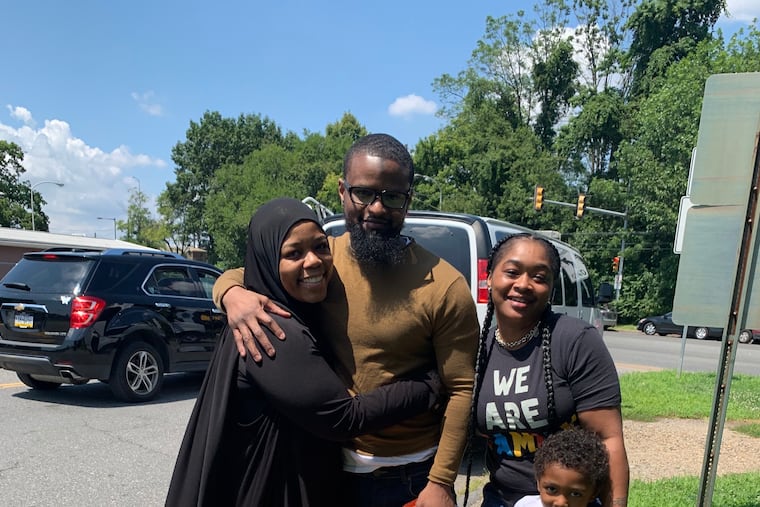Donald Outlaw, cleared of murder, is Philadelphia’s 17th exoneree in 3 years
“If it wasn’t for the fact that he was so adamant, and pushed so hard for his innocence, then he’d still be [in prison]. He never quit."

In 2000, after Jamal Kelly was fatally shot on a street in East Germantown, he used his last breaths to implicate his killer. “Shank did it,” he repeatedly told police who arrived at the scene.
Yet, Donald Outlaw — who was then a teenager, notably not nicknamed “Shank” — was convicted and served more than 15 years in prison for the murder.
On Tuesday, Outlaw, identified in court documents as Robert Outlaw, became the 17th person exonerated with support of the Philadelphia District Attorney’s Conviction Integrity Unit since D.A. Larry Krasner took office three years ago. And, like most of those cases, Outlaw’s involves allegations of serious official misconduct that led to a wrongful conviction.
Outlaw was released on bail last year after his conviction was overturned following an evidentiary hearing in which a witness, Charles Paladino, recanted, saying he’d concocted a story in coordination with Philadelphia homicide detectives. Another eyewitness — who actually saw the neighborhood man known as Shank shoot Kelly — was discovered only after Outlaw’s wife, Monique Solomon Outlaw, began posting fliers in the neighborhood where the crime occurred, asking anyone with information to come forward.
» READ MORE: Juvenile lifers with innocence claims have to choose between parole or fighting for exoneration
The District Attorney’s Office had initially planned to retry the case, arguing in one court filing that the new evidence “fails to even budge the needle on the scale, weighed down by the evidence of defendant’s guilt.”
But the Conviction Integrity Unit reviewed the file this year and reversed course. The CIU, in its filings, said it reinterviewed Paladino, learning that he had cooperated with detectives in at least one other homicide case, and uncovering further evidence that his claims against Outlaw were not to be believed.
Kelly’s parents were informed of the decision, according to the CIU. His father, Augustus Kelly, did not wish to comment, his wife said by phone Tuesday.
CIU chief Patricia Cummings said the reversal can be attributed to “what lens are you using as you look at the case.” Previously, the prosecutor took an adversarial approach to defending the conviction. But now, “the conviction has been set aside. That person has returned to a presumption of innocence, and the question becomes can you prove this person committed a crime beyond a reasonable doubt. And my position from reviewing the case is you can’t.”
Philadelphia Common Pleas Court Judge J. Scott O’Keefe accepted the DA’s decision to drop charges in a brief hearing conducted by Zoom.
After the hearing, lawyer Edward J. Foster — who handled the case with help from the Pennsylvania Innocence Project — credited the exoneration in large part to Outlaw’s steadfast commitment to clearing his name.
“If it wasn’t for the fact that he was so adamant, and pushed so hard for his innocence, then he’d still be upstate. He never quit,” Foster said. He said Outlaw was still processing the news and not yet prepared for an interview. “This is the first time in 18 years that he’s legitimately free — a free man with nothing hanging over his head.”
Foster had been involved in the case since 2017, and persuaded the DA to open its file. In it he found evidence he said should have been turned over, including a letter from Paladino to Detective Howard Peterman promising: “I’ve put together a speech for the upcoming trial. I’m sure you’ll be happy with it.”
Contacted by phone Tuesday morning, Peterman hung up on a reporter without commenting.
Cummings, who in other exonerations has excoriated detectives and prosecutors for misconduct, said the failings in Outlaw’s case were less clear-cut. “I look at this as a generally really poor quality investigation,” she said.
But she found it “disturbing” that police had ignored Kelly’s dying declaration — even though at one point records show they had identified and investigated Shank — and instead pursued Outlaw. In fact, Shank became one of four men who gave statements against Outlaw that they recanted at trial, a failing that prosecutors at the time blamed on witness intimidation.
Shank, who was from the neighborhood where the shooting took place and whose name was Derrick Alston, has since died.
Outlaw’s win makes 20 exonerations by the Pennsylvania Innocence Project, which was founded in 2009. “These cases take many years and thousands of hours of work to undo a conviction that never should have happened,” Nan Feyler, the organization’s executive director, said in statement.
For critics, it’s one more indication of the need for systemic reforms.
“Were the prosecutors trusting the homicide detectives too much and not asking to see the information in their file? Were the police withholding the information?” said Marissa Bluestine, of the Quattrone Center for the Fair Administration of Justice at the University of Pennsylvania’s law school. “Either way, it’s problematic. It’s something you need to address on a system level when you see it again and again and again.”